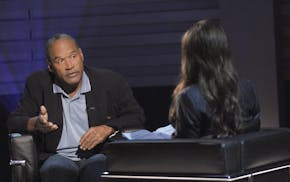An inspiring underdog tale, Arshay Cooper's debut is also a riveting plunge into a world that will feel utterly alien and disorienting to many readers.
It's the West Side of Chicago in the 1990s, a place where the streets penetrate to the marrow. Gangs, drugs, violence and despair are omnipresent, claiming lives and souls.
Cooper, a teenager with an absent father, a drug-addicted mother and a keen sense of living every moment on a perilous edge, tells the story of how he came to captain the nation's first all-Black high school rowing team.
It sounds like the very stereotype of a feel-good movie — and indeed, a documentary based on the book will be released July 31. Yet it happened. A couple of well-meaning white rowers showed up at an inner-city school and coaxed a few skeptical kids to try this weird sport, "so long reserved for schools like Harvard and Yale, Oxford and Cambridge," Cooper writes. "Places light years away from the West Side of Chicago."
The kids — none of whom can even swim at first — struggle with the demands of the sport: physical, mental and social. As the months go by, they learn to put aside their deep mistrust of the world and each other. They grow and bond, proudly and confidently competing against the elite white preppies who had intimidated them at the start.
It's not as easy as it sounds, though. Keeping the team together is a constant struggle. Members drop out due to family demands — one boy's father doesn't trust the white coaches — or the lure of money from dealing drugs.
And that's where Cooper's story is endlessly fascinating and frightening. Anyone who grew up in a stable home — especially a white one — will be amazed that a person could thrive in the dysfunctional society these kids were born into.
Violence is a constant, inside and outside the homes. Trust is scarce, even among family members. People put on emotional armor early in life and rarely take it off.
Looking back some two decades later, Cooper re-creates the thoughts and emotions of a youngster on the cusp of adulthood. The book is both an inner monologue and a chronicle of experiences and conversations giving insight into how life was lived at that time and place in America.
Cooper, who went to culinary school and became a personal chef to celebrities, won't win prizes for his writing. His characters aren't always well developed and the story, though shot through with inherent drama, is told in a straight chronological fashion that sometimes feels flat.
But the substance of what he has to say is important and overshadows any quibbles. His portrait of young men doing their best to rise above their circumstances is always interesting and often riveting. Cooper, a sensitive young man, is attuned to the moods and needs of others. Lacking role models in his life (although his mother does kick her drug habit and become a positive influence), he finds them in the Black lives portrayed in television shows of the era: "Cosby," "A Different World," "Fresh Prince of Bel Air."
Many critics have scoffed at those shows, calling them unrealistic. Yet for this young Black man, the lives they modeled were something to aspire to.
There are few huge, dramatic moments in Cooper's tale. Yes, there's a buildup to several of the team's races, but those aren't where the book's strengths lie.
Rather, they're in the day-by-day, month-by-month portrait Cooper paints of the world that shaped him — and that he escaped.
He knew he wanted something more from life, and he and a fortunate few found it in the frail shell of a racing boat.
"The history we make today," he writes, "is simple: that we survived. I survived my past.
"In crew you move ahead by looking in the opposite direction. I learned that it's okay to look back, as long as you keep moving forward."
John Reinan is a Star Tribune reporter.
A Most Beautiful Thing
By: Arshay Cooper.
Publisher: Flatiron Books, 240 pages, $27.99.
ABBA, Blondie, and the Notorious B.I.G. enter the National Recording Registry
West Virginia transgender sports ban discriminates against teen athlete, appeals court says
Dr. Martens shares plunge to record low after weak US revenue outlook
Visa fees for international artists to tour in the US shot up 250% in April. It could be devastating

